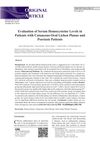 3 citations,
September 2017 in “Galen medical journal”
3 citations,
September 2017 in “Galen medical journal” Patients with psoriasis and cutaneous-oral lichen planus have higher blood homocysteine levels than healthy people.
[object Object]  12 citations,
July 2011 in “European Journal of Dermatology”
12 citations,
July 2011 in “European Journal of Dermatology” The VSCAPSI is a helpful method for evaluating the severity of scalp psoriasis.
 7 citations,
April 2023 in “Frontiers in immunology”
7 citations,
April 2023 in “Frontiers in immunology” Oral baricitinib and ruxolitinib are effective and safe for treating alopecia areata.
 45 citations,
February 2011 in “Journal of the European Academy of Dermatology and Venereology”
45 citations,
February 2011 in “Journal of the European Academy of Dermatology and Venereology” People with lichen planus have higher bad cholesterol and lower good cholesterol, increasing their risk for heart disease.
 June 2024 in “International journal of nanomedicine”
June 2024 in “International journal of nanomedicine” Azelaic acid micro/nanocrystals, especially with ultrasound and salicylic acid, greatly improve acne treatment.
 43 citations,
March 2011 in “Journal of psychosomatic research”
43 citations,
March 2011 in “Journal of psychosomatic research” Kids with alopecia areata may experience more stress but not necessarily feel more anxious or depressed than others.
 2 citations,
September 2015 in “Journal of the Egyptian Women's Dermatologic Society (Print)”
2 citations,
September 2015 in “Journal of the Egyptian Women's Dermatologic Society (Print)” People with psoriasis and depression have lower BDNF levels, which could help measure depression in those with psoriasis.
 February 2024 in “International journal of health, medicine and nursing practice”
February 2024 in “International journal of health, medicine and nursing practice” Raising awareness about PCOS can improve women's quality of life.
 July 2023 in “Dermatology and therapy”
July 2023 in “Dermatology and therapy” People with alopecia areata may have a higher risk of blood clots.
 June 2020 in “Journal of Investigative Dermatology”
June 2020 in “Journal of Investigative Dermatology” Getting insurance to cover the hair loss treatment tofacitinib is hard because it's not officially approved for that use.
[object Object]  September 2019 in “Journal of Investigative Dermatology”
September 2019 in “Journal of Investigative Dermatology” Retinol significantly reduces neck wrinkles.
 September 2019 in “Journal of Investigative Dermatology”
September 2019 in “Journal of Investigative Dermatology” Sandalore, a synthetic scent, was found to reduce hair loss and improve hair growth in women with hair shedding issues.
 September 2019 in “Journal of Investigative Dermatology”
September 2019 in “Journal of Investigative Dermatology” Sandalore® reduces hair shedding and increases hair volume in women with telogen effluvium.
 March 2019 in “Journal of Investigative Dermatology”
March 2019 in “Journal of Investigative Dermatology” Seborrheic dermatitis is influenced by diet, genetics, and psychological factors.
 January 2019 in “ARC journal of pharmaceutical sciences”
January 2019 in “ARC journal of pharmaceutical sciences” Acne can be managed with various treatments and requires psychological support due to its emotional impact.
 98 citations,
July 2014 in “Trends in Molecular Medicine”
98 citations,
July 2014 in “Trends in Molecular Medicine” Hair follicles are hormone-sensitive and involved in growth and other functions, with potential for new treatments, but more research is needed.
 19 citations,
June 2021 in “Tissue Engineering and Regenerative Medicine”
19 citations,
June 2021 in “Tissue Engineering and Regenerative Medicine” Fat stem cell particles help regrow hair.
 5 citations,
June 2015 in “Veterinary dermatology”
5 citations,
June 2015 in “Veterinary dermatology” A dog with complete hair loss regrew most hair after treatment, with no relapse after stopping treatment.
 March 2023 in “Clinical, cosmetic and investigational dermatology”
March 2023 in “Clinical, cosmetic and investigational dermatology” IL-33 is linked to hair follicle damage in psoriasis and could be a treatment target for hair loss in this condition.
 176 citations,
August 2015 in “The journal of allergy and clinical immunology/Journal of allergy and clinical immunology/The journal of allergy and clinical immunology”
176 citations,
August 2015 in “The journal of allergy and clinical immunology/Journal of allergy and clinical immunology/The journal of allergy and clinical immunology” Alopecia areata involves immune activation in the scalp, suggesting treatments targeting TH1, TH2, and IL-23 pathways.
 September 2024 in “Journal of the American Academy of Dermatology”
September 2024 in “Journal of the American Academy of Dermatology” PRO-C22 can help diagnose and monitor the severity of hidradenitis suppurativa.
52 citations,
January 2017 in “Dermatology” Swiss experts recommend specific guidelines for diagnosing and treating hidradenitis suppurativa to improve patient care.
 6 citations,
May 2023 in “Drugs”
6 citations,
May 2023 in “Drugs” Baricitinib helps regrow hair in adults with severe alopecia better than a placebo and is approved for treatment, but long-term effects are still unknown.
 January 2024 in “Authorea (Authorea)”
January 2024 in “Authorea (Authorea)” Nanomaterials can significantly improve wound healing and future treatments may include smart, real-time monitoring.
139 citations,
October 2005 in “Journal of Investigative Dermatology” The nail matrix has a reduced immune response, protecting it from autoimmunity.
 6 citations,
February 2023 in “Advances in Therapy”
6 citations,
February 2023 in “Advances in Therapy” Baricitinib, a drug for rheumatoid arthritis, atopic dermatitis, and alopecia areata, is generally safe with low risk of major side effects, even in patients with risk factors. It's also effective in promoting hair regrowth in alopecia areata patients.
 November 2024 in “Medicina”
November 2024 in “Medicina” Recognizing scalp symptoms in PRP is crucial for proper diagnosis and treatment.
March 2024 in “Current issues in molecular biology” Personalized medicine in dermatology uses molecular biomarkers to improve diagnosis and treatment but needs further advancements for practical use.
 January 2024 in “International Journal of Molecular Sciences”
January 2024 in “International Journal of Molecular Sciences” Blocking the protein CXCL12 with a specific antibody can increase hair growth in common hair loss conditions.
 1 citations,
June 2023 in “Dermatology and therapy”
1 citations,
June 2023 in “Dermatology and therapy” People with Alopecia Areata have more herpes simplex infections but similar rates of cancer, blood clots, and heart disease compared to those without it.



























